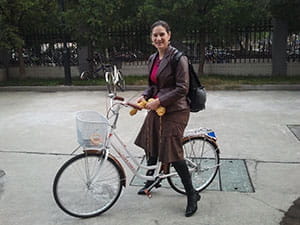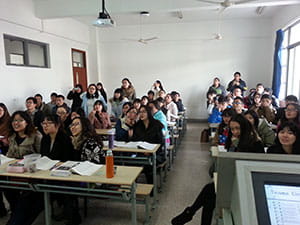A PhD alumna builds cross-cultural relationships through education

The first day of class can be nerve-wracking for students and professors alike. Throw in a big cultural difference, and it may border on frightening. When Dr. Annette Padilla ’13 taught her first undergraduate business class at Jiangnan University North American College in Wuxi, China, she looked out at the expectant faces of more than 40 students—most spoke little English and had never left China. She knew she had to devise a way to break down those barriers—quickly.
“I do a lot of photo sharing,” Padilla says. Students delight at a photo from her recent vacation to Malaysia or a picture of Padilla smiling atop her bicycle that she has interspersed with her lecture slides. “They love the pictures of my mother, my dad, and my sister,” she says. “These folks are really bonded to their families.” Providing a glimpse of her life beyond the classroom helps Padilla find common ground with her students, laying the foundation for more engaged learning.

Before pursuing her degree at Walden, a two-year contract at California Miramar University that allowed her to teach in Vietnam inspired her passion for international education and curriculum development. But it didn’t end there. “I was interested in going back overseas after I finished my PhD in Public Policy and Administration,” says Padilla.
As an international professor, Padilla brings a different perspective to teaching by considering how her students might learn best in a second language. She uses Bloom’s Taxonomy to guide her in creating and revising objectives for her students, taking into account their language skills and baseline knowledge. Most of her students are not used to interacting in groups or thinking critically about real-life problems. Padilla challenges them to develop the skills they need for success moving forward by working together to solve problems and present to the larger group. “I have seen some students grow their skills in just the 9 weeks I work with them,” she says.
It’s not just at the university where her problem-solving skills have been helpful in her new home. “Every day is challenging; you don’t really speak the language, you don’t know the customs, and you don’t know where you’re going sometimes,” Padilla says. “It’s similar to the PhD experience where you have to adjust to a steep learning curve. I do a lot of research on my own and find new ways to communicate when I can’t rely on language. You just make it work.”

Padilla represents the U.S. every day, and she’s seen as a leader at the university because of her degree and global insights. She was recently invited to speak at an international conference hosted by the university about ethics and corruption in China. “I presented some of my research findings on social justice and ethics in front of a Chinese audience with professors from other provinces,” Padilla says. “If I hadn’t written that dissertation, I never would have had this experience of being seen as a thought leader in a foreign country.”
Although the experience has been challenging, it has also been rewarding. “It’s a really healthy experience, getting pushed out of your comfort zone,” she says. “We need our smartest people to help build relationships across borders. What we do in education can improve diplomacy, world peace, and how we understand each other. I hope I will be considered one of those people when I leave here.”



